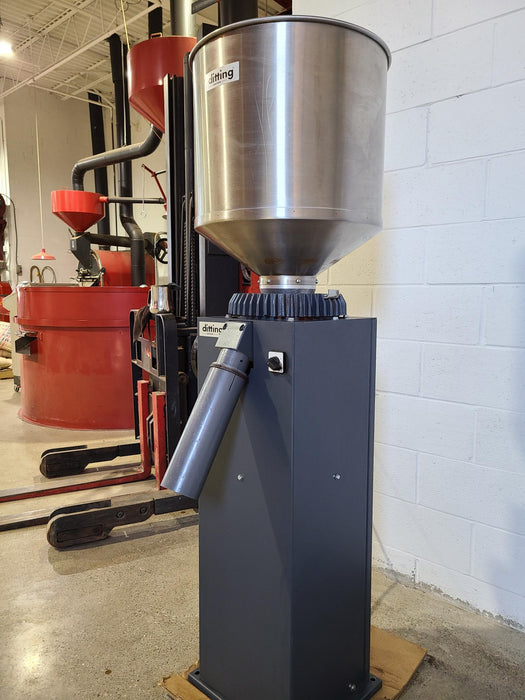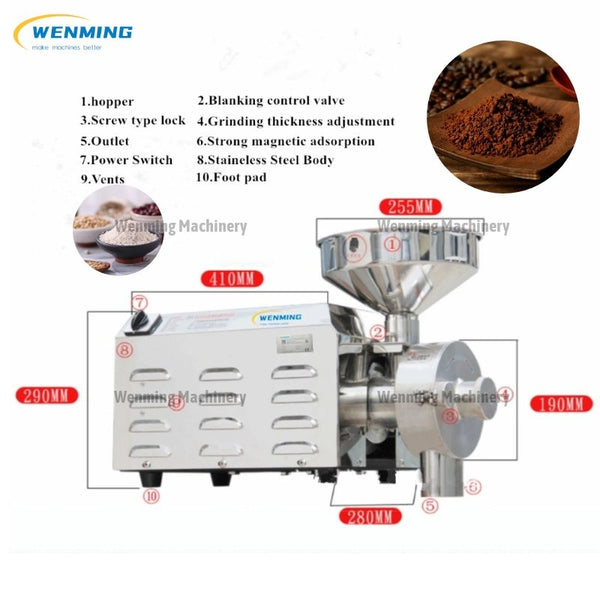Industrial Coffee Grinder: Selecting the Best Model for Your Business
Industrial Coffee Grinder: Selecting the Best Model for Your Business
Blog Article
Industrial Coffee Mill Overview: Boost Effectiveness and High Quality
In the competitive landscape of coffee manufacturing, picking the ideal commercial coffee mill plays a pivotal function in boosting both performance and item quality. Recognizing the subtleties of different grinder kinds and vital attributes-- such as personalized work setups and durable construction-- can considerably influence the final flavor profile of the coffee.
Comprehending Grinder Types
When selecting an industrial coffee grinder, understanding the various kinds available is essential for enhancing both flavor extraction and operational effectiveness. Both main types of mills are blade grinders and burr grinders. Blade mills use sharp blades that slice coffee beans into irregular sizes, resulting in uneven removal and potentially unwanted flavors. While blade mills are usually extra ideal and budget friendly for small operations, they are normally not suggested for commercial use.

Ultimately, choosing the right kind of grinder is indispensable to preserving top quality and efficiency in coffee manufacturing, making it essential for organizations to invest in high-grade burr grinders for optimum results.
Secret Attributes to Consider
Choosing an industrial coffee mill requires cautious factor to consider of several essential features that can substantially affect both performance and the general coffee experience. Among the key aspects to examine is the grinding system. Burr mills are generally chosen over blade grinders, as they supply a regular grind dimension, which is essential for optimum extraction and taste.
Another crucial function is the grinder's capacity. A versatile mill with multiple settings permits you to customize the work dimension to different brewing approaches, boosting the coffee's taste profile.
Examine the grinder's sound degree, especially in an active café or production environment, where extreme noise can be disruptive. Spending in a grinder that stabilizes these functions can considerably enhance both operational performance and the top quality of the coffee served.
Optimizing Grinding Refine
To achieve the very best lead to coffee prep work, maximizing the grinding process is essential. The grind dimension significantly influences extraction, taste, and total quality of the brewed coffee. Different brewing approaches require particular grind dimensions; for instance, espresso demands a fine grind, while French press demands a coarse structure. Recognizing the relationship between work dimension and developing approach is the primary step in optimization.


Furthermore, monitoring the grinding speed can optimize the process. Slower grinding commonly produces less heat, preserving delicate flavors and scents. On the other hand, quicker grinding may produce excessive warm, negatively affecting the coffee's high quality.
Maintenance and Care Tips
Appropriate upkeep and care of industrial coffee grinders are essential for making certain optimal efficiency and long life. Normal cleaning is the foundation of upkeep; deposit build-up can impact flavor and grinding efficiency. It is recommended to cleanse the mill after each her latest blog use, wiping down the outside and getting rid of any kind of coffee grounds from the burrs.
Furthermore, examine the grinding burrs for wear and tear. Plain burrs can jeopardize work uniformity, so they must be changed as required. Industrial Coffee Grinder. Periodically calibrating the grinder is also critical, as this keeps the preferred grind size for numerous developing techniques
Lubrication of moving components need to be executed according to the maker's specifications, as this lowers friction and lengthens the life of the devices. It is necessary to utilize food-grade lubricating substances to ensure safety and security and compliance with wellness policies.
Lastly, keep the grinder in a completely dry and steady environment to stop rust and deterioration. By adhering to these upkeep and treatment suggestions, drivers can improve the performance of their industrial coffee mills while ensuring high-quality outcome and extended functional life.
Return on Financial Investment Evaluation
Assessing the roi (ROI) for industrial coffee grinders is vital for businesses seeking to optimize their coffee manufacturing capacities. A comprehensive ROI evaluation aids establish the economic practicality of buying high-grade mills, permitting businesses to consider the preliminary expenses against prospective gains.
Assess the purchase price of the mill, including installation and any kind of essential adjustments to existing infrastructure. High-performance mills commonly lead to decreased grinding time and increased throughput, which can dramatically improve productivity.
In addition, think about the effect on item high quality. Industrial Coffee Grinder. Superior mills produce a more regular grind dimension, which can improve taste accounts and customer satisfaction, inevitably driving sales. By enhancing the top quality of the last product, services can justify greater pricing, causing increased earnings
Conclusion
In recap, an industrial coffee grinder plays a crucial function in boosting both effectiveness and product high quality within coffee manufacturing. By selecting premium burr mills furnished with essential functions such as adjustable work settings and long lasting construction, services can ensure ideal taste extraction. Regular maintenance is vital for sustaining grinder performance and optimizing consumer contentment. Ultimately, the tactical investment in a trustworthy mill adds dramatically to improved income and competitiveness in the coffee market.
In the affordable landscape of coffee manufacturing, selecting the you can check here best industrial coffee grinder plays a pivotal duty in boosting both effectiveness and product quality. The two key kinds of link grinders are blade grinders and burr mills. Within the burr mill classification, there are flat burr mills and conelike burr grinders, each with its benefits. Burr mills are typically chosen over blade grinders, as they give a constant grind dimension, which is crucial for ideal extraction and taste.
In summary, a commercial coffee mill plays an essential role in boosting both performance and product top quality within coffee manufacturing.
Report this page